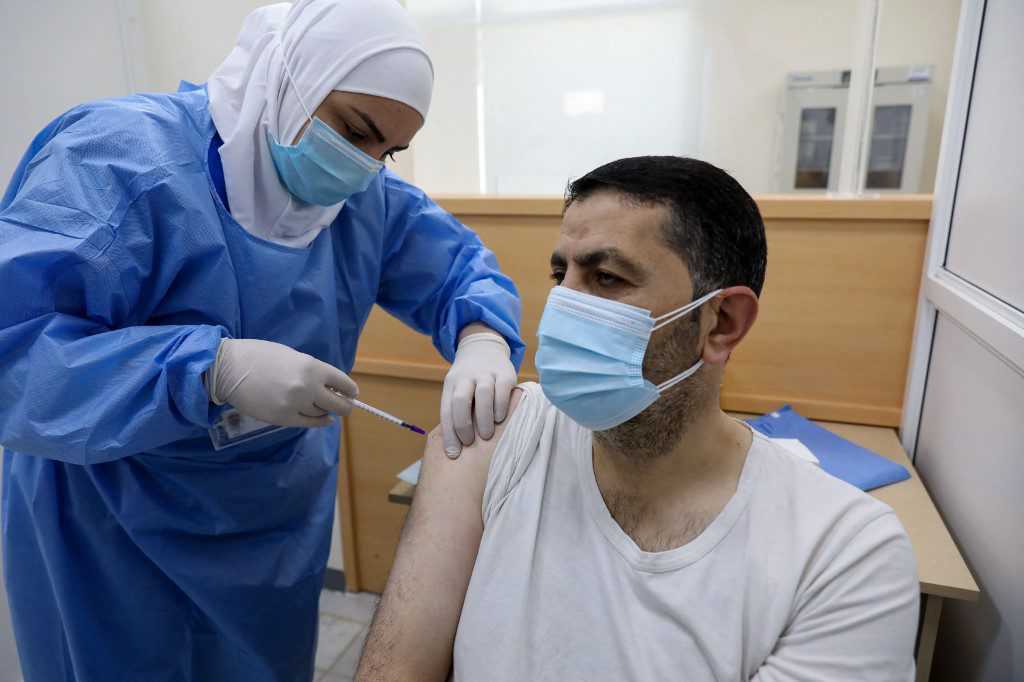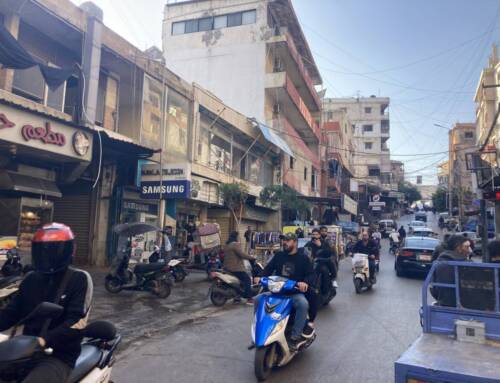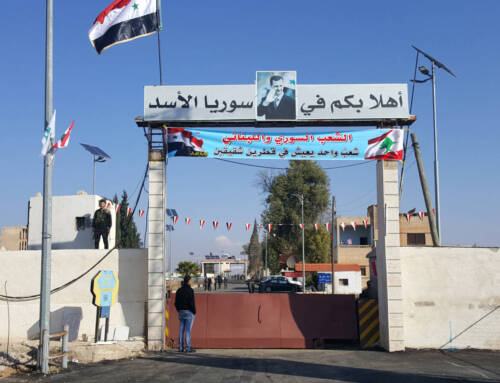Syrian refugees in Lebanon are eligible to get the COVID-19 vaccine, but few know how
In Lebanon, few Syrian refugees know how to register to get the COVID-19 vaccine
9 March 2021
BEIRUT — While pushing his potato cart in the streets of the Shatila refugee camp in the suburbs of Beirut, Hassan Houran said he wanted to get vaccinated against COVID-19 but, like many Syrian refugees, had no idea how to register to get it.
“Nobody is helping us; we ask the UN to help us get the vaccine so we can protect our health and our children’s health,” said the 41-year-old originally from Aleppo countryside.
To get the COVID-19 vaccine in Lebanon, one has to register on the designated online platform, IMPACT. The registration can also be done by calling 1214 or via WhatsApp at 700 56 182.
Syria Direct asked several Syrian refugees if they wanted to take the vaccine and if they had registered on the online platform:
Out of the estimated 1.5 million Syrian refugees in Lebanon, only 13,594 Syrians have registered on IMPACT, of which 574 have been vaccinated. Lebanon also hosts 28,800 Palestinian Refugees from Syria (PRS). They are included in the category of Palestinian refugees on the e-gov platform. So far, 13,277 Palestinian refugees have registered, of which 1,790 have been vaccinated.
Comparatively, these rates are lower than the general figures in Lebanon, where out of a population of six million, 900,982 people have registered and 71,700 vaccines have been administered. To date, Lebanon has had 5,089 COVID-19 related deaths, among them 159 Syrian refugees. That is a mortality rate among the Syrian community of 4.3% compared to a 1.2% national average, according to Dalal Harb, UNHCR spokeswoman in Lebanon.
Low awareness on how to register on the vaccination platform and vaccine hesitancy fueled by misinformation are among the factors that explain the low vaccination rates among Syrian refugees in Lebanon.
In addition, there are “challenges in accessing the platform, especially for some groups like the elderly and those who do not use smart devices and the internet,” Hoda Samra, UNRWA spokeswoman in Lebanon, said. UNRWA is responsible for providing services for PRS, while UNHCR is in charge of Syrian refugees.
UNHCR is reaching out to refugees above 75 years old to raise awareness about the COVID-19 vaccine. “We want to inform, help register and monitor; we try to level up the awareness level and address any hesitancy towards the vaccine,” explained Harb.
But even when the registration is done, there is the challenge of transporting elderly persons to the vaccination center. For some, the transportation cost is also an obstacle, according to Harb.
Unaware they can get the vaccine
Lebanon has acquired six million doses of vaccines, of which 250,000 doses are expected in the first quarter of 2021. The vaccine, according to the National Vaccination plan, is provided for free to all persons residing in Lebanon, regardless of their nationality and residency status.
But few Syrian refugees are aware of that. In an International Medical Corps (IMC) survey of 6,900 respondents, 58% of the non-Lebanese participants did not know the vaccine was for free and for all nationalities.
“It is quite worrying at this point, when the vaccine campaign is already underway, that such an overwhelming number [of Syrian refugees] have not registered for the vaccine; the awareness is extremely low,” pointed out Nadia Hardman, a researcher in the Refugee and Migrants Rights Division of Human Rights Watch.
In the last 15 days, Abdulaziz al-Abbas, a UN volunteer doing community health surveillance, has been calling Syrian refugees above 75 years old to inform them about the vaccine and help them register, especially those that “suffer illnesses and don’t know how to fill the data about their condition on the platform,” he explained.
When he informs them that refugees can also get the vaccine, many are surprised. “Do you mean we can register now, at the same time as the Lebanese?” they asked him. “As a Syrian refugee, we think that we are second-class citizens, so the vaccine will be first for the Lebanese, and then for the Palestinians or Syrians,” al-Abbas said.
Although the vaccine is provided regardless of residency status, many Syrians lacking residency permits have “raised the fear of harassment, detention or deportation for registering their ID number with a government-led application,” Hardman explained.
The World Bank and the International Federation of Red Cross and Red Crescent Societies are monitoring the vaccination roll-out to ensure it is a fair process. On February 23, local media reported that several Lebanese politicians had jumped the queue to get the vaccine.
According to UNHCR spokesperson, “no discrimination against Syrian refugees have been reported in the vaccination centers.”
Vaccine hesitancy
Only 3 out of 10 people in Lebanon are willing to take the vaccine, according to a World Bank survey based on 3,866 interviews. In this line, the IMC survey showed that 74% of respondents were unwilling or hesitant to take the vaccine.
Eighty percent of IMC’s respondents are concerned with side effects of the vaccine, and others do not trust the “healthcare system in Lebanon to be able to maintain the cold chain and deliver the vaccine safely,” Dr. Nada Awada, Senior Medical Advisor at IMC, explained.
Misinformation about the vaccine also appears to be a significant obstacle. According to IMC’s survey, 65% were unsure about the risk of the vaccine changing their DNA. A study by the Maharat Foundation and Internews tracking fake news about COVID-19 in the Syrian community in Lebanon highlighted the two most widespread rumors: that the vaccines will kill many people; and that the virus only affects people living in cold climates.
Through his daily calls with Syrian refugees, al-Abbas has become familiar with some of these rumors spread via WhatsApp or Facebook. “Many are hesitant to get vaccinated. They are waiting to see what the effect on other people is before they get it,” he said. Some refugees told him they do not need to get vaccinated because they have already had corona – which is not true – while others consider that “they are strong and don’t need the vaccine.”
In IMC’s survey, 90% of Syrians said they will be encouraged to take the vaccine if they see others they trust take it. “It is really important to identify who are the influencers in the Syrian community; they can be religious leaders, doctors or healthcare workers; we have to look into this,” Dr. Awada said.
A race against time
Due to lockdown restrictions, NGOs are raising awareness via phone calls or social media. UNRWA and UNHCR are sending messages through social media encouraging refugees to register to take the vaccine.
Starting this week, IMC plans to contact 6,000 beneficiaries – Syrian and vulnerable Lebanese – to help them register on the vaccination platform. They are focusing on the priority group.
Per the national plan, healthcare workers and those above 75 years old are the first priority group; they will be followed by those between 65-74 years old, those between 55-64 that have a pre-existing health condition and workers in epidemiological surveillance. Later, those between 55-64 years old and healthcare workers not vaccinated previously and those between 16-54 years old with a chronic disease. Then it will be the turn for essential workers; and finally, the rest of the population.







